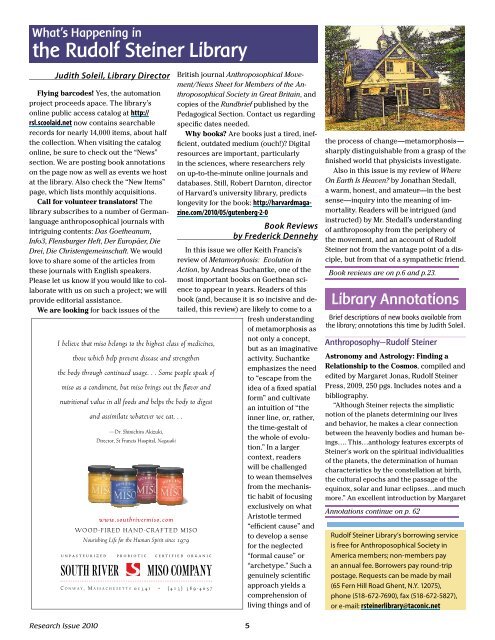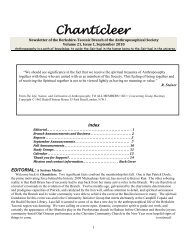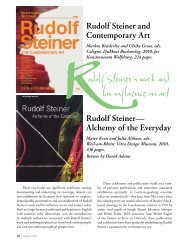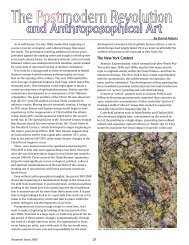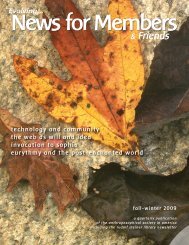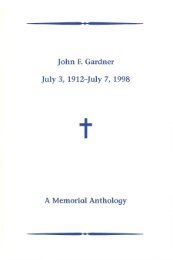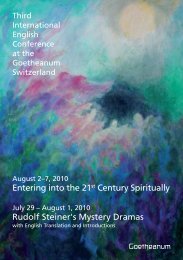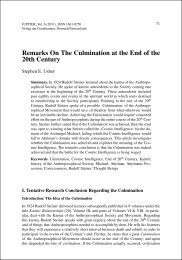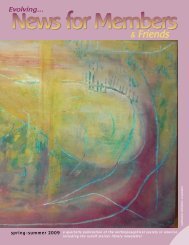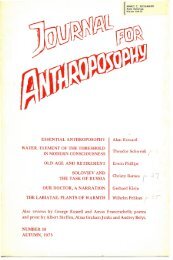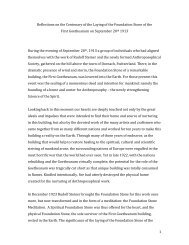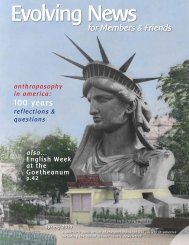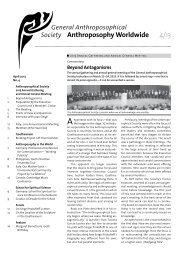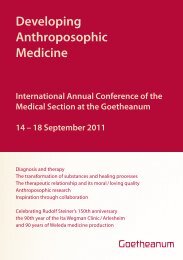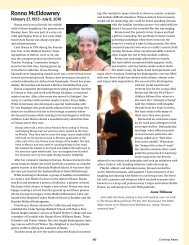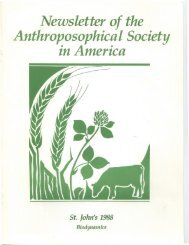Download - Anthroposophical Society in America
Download - Anthroposophical Society in America
Download - Anthroposophical Society in America
You also want an ePaper? Increase the reach of your titles
YUMPU automatically turns print PDFs into web optimized ePapers that Google loves.
What’s Happen<strong>in</strong>g <strong>in</strong><br />
the Rudolf Ste<strong>in</strong>er Library<br />
Judith Soleil, Library Director<br />
Fly<strong>in</strong>g barcodes! Yes, the automation<br />
project proceeds apace. The library’s<br />
onl<strong>in</strong>e public access catalog at http://<br />
rsl.scoolaid.net now conta<strong>in</strong>s searchable<br />
records for nearly 14,000 items, about half<br />
the collection. When visit<strong>in</strong>g the catalog<br />
onl<strong>in</strong>e, be sure to check out the “News”<br />
section. We are post<strong>in</strong>g book annotations<br />
on the page now as well as events we host<br />
at the library. Also check the “New Items”<br />
page, which lists monthly acquisitions.<br />
Call for volunteer translators! The<br />
library subscribes to a number of Germanlanguage<br />
anthroposophical journals with<br />
<strong>in</strong>trigu<strong>in</strong>g contents: Das Goetheanum,<br />
Info3, Flensburger Heft, Der Europäer, Die<br />
Drei, Die Christengeme<strong>in</strong>schaft. We would<br />
love to share some of the articles from<br />
these journals with English speakers.<br />
Please let us know if you would like to collaborate<br />
with us on such a project; we will<br />
provide editorial assistance.<br />
We are look<strong>in</strong>g for back issues of the<br />
I believe that miso belongs to the highest class of medic<strong>in</strong>es,<br />
those which help prevent disease and strengthen<br />
the body through cont<strong>in</strong>ued usage. . . Some people speak of<br />
miso as a condiment, but miso br<strong>in</strong>gs out the flavor and<br />
nutritional value <strong>in</strong> all foods and helps the body to digest<br />
and assimilate whatever we eat. . .<br />
—Dr. Sh<strong>in</strong>ichiro Akizuki,<br />
Director, St Francis Hospital, Nagasaki<br />
www.southrivermiso.com<br />
WOOD-FIRED HAND-CRAFTED MISO<br />
Nourish<strong>in</strong>g Life for the Human Spirit s<strong>in</strong>ce 1979<br />
unpasteurized probiotic certified organic<br />
SOUTH RIVER<br />
British journal <strong>Anthroposophical</strong> Movement/News<br />
Sheet for Members of the <strong>Anthroposophical</strong><br />
<strong>Society</strong> <strong>in</strong> Great Brita<strong>in</strong>, and<br />
copies of the Rundbrief published by the<br />
Pedagogical Section. Contact us regard<strong>in</strong>g<br />
specific dates needed.<br />
Why books? Are books just a tired, <strong>in</strong>efficient,<br />
outdated medium (ouch!)? Digital<br />
resources are important, particularly<br />
<strong>in</strong> the sciences, where researchers rely<br />
on up-to-the-m<strong>in</strong>ute onl<strong>in</strong>e journals and<br />
databases. Still, Robert Darnton, director<br />
of Harvard’s university library, predicts<br />
longevity for the book: http://harvardmagaz<strong>in</strong>e.com/2010/05/gutenberg-2-0<br />
Book Reviews<br />
by Frederick Dennehy<br />
In this issue we offer Keith Francis’s<br />
review of Metamorphosis: Evolution <strong>in</strong><br />
Action, by Andreas Suchantke, one of the<br />
most important books on Goethean science<br />
to appear <strong>in</strong> years. Readers of this<br />
book (and, because it is so <strong>in</strong>cisive and detailed,<br />
this review) are likely to come to a<br />
fresh understand<strong>in</strong>g<br />
of metamorphosis as<br />
not only a concept,<br />
but as an imag<strong>in</strong>ative<br />
activity. Suchantke<br />
emphasizes the need<br />
to “escape from the<br />
idea of a fixed spatial<br />
form” and cultivate<br />
an <strong>in</strong>tuition of “the<br />
<strong>in</strong>ner l<strong>in</strong>e, or, rather,<br />
the time-gestalt of<br />
the whole of evolution.”<br />
In a larger<br />
context, readers<br />
will be challenged<br />
to wean themselves<br />
from the mechanistic<br />
habit of focus<strong>in</strong>g<br />
exclusively on what<br />
Aristotle termed<br />
“efficient cause” and<br />
to develop a sense<br />
for the neglected<br />
“formal cause” or<br />
“archetype.” Such a<br />
genu<strong>in</strong>ely scientific<br />
approach yields a<br />
comprehension of<br />
liv<strong>in</strong>g th<strong>in</strong>gs and of<br />
MISO COMPANY<br />
C onway, MassaC husetts 01341 • (413) 369-4057<br />
the process of change—metamorphosis—<br />
sharply dist<strong>in</strong>guishable from a grasp of the<br />
f<strong>in</strong>ished world that physicists <strong>in</strong>vestigate.<br />
Also <strong>in</strong> this issue is my review of Where<br />
On Earth Is Heaven? by Jonathan Stedall,<br />
a warm, honest, and amateur—<strong>in</strong> the best<br />
sense—<strong>in</strong>quiry <strong>in</strong>to the mean<strong>in</strong>g of immortality.<br />
Readers will be <strong>in</strong>trigued (and<br />
<strong>in</strong>structed) by Mr. Stedall’s understand<strong>in</strong>g<br />
of anthroposophy from the periphery of<br />
the movement, and an account of Rudolf<br />
Ste<strong>in</strong>er not from the vantage po<strong>in</strong>t of a disciple,<br />
but from that of a sympathetic friend.<br />
Book reviews are on p.6 and p.23.<br />
Library Annotations<br />
Brief descriptions of new books available from<br />
the library; annotations this time by Judith Soleil.<br />
Anthroposophy—Rudolf Ste<strong>in</strong>er<br />
Astronomy and Astrology: F<strong>in</strong>d<strong>in</strong>g a<br />
Relationship to the Cosmos, compiled and<br />
edited by Margaret Jonas, Rudolf Ste<strong>in</strong>er<br />
Press, 2009, 250 pgs. Includes notes and a<br />
bibliography.<br />
“Although Ste<strong>in</strong>er rejects the simplistic<br />
notion of the planets determ<strong>in</strong><strong>in</strong>g our lives<br />
and behavior, he makes a clear connection<br />
between the heavenly bodies and human be<strong>in</strong>gs….<br />
This…anthology features excerpts of<br />
Ste<strong>in</strong>er’s work on the spiritual <strong>in</strong>dividualities<br />
of the planets, the determ<strong>in</strong>ation of human<br />
characteristics by the constellation at birth,<br />
the cultural epochs and the passage of the<br />
equ<strong>in</strong>ox, solar and lunar eclipses…and much<br />
more.” An excellent <strong>in</strong>troduction by Margaret<br />
Annotations cont<strong>in</strong>ue on p. 62<br />
Rudolf Ste<strong>in</strong>er Library’s borrow<strong>in</strong>g service<br />
is free for <strong>Anthroposophical</strong> <strong>Society</strong> <strong>in</strong><br />
<strong>America</strong> members; non-members pay<br />
an annual fee. Borrowers pay round-trip<br />
postage. Requests can be made by mail<br />
(65 Fern Hill Road Ghent, N.Y. 12075),<br />
phone (518-672-7690), fax (518-672-5827),<br />
or e-mail: rste<strong>in</strong>erlibrary@taconic.net<br />
Research Issue 2010<br />
5


